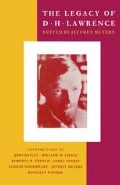Abstract
Although D. H. Lawrence occupies a uniquely important place in the development of modern American poetry, his role is often obscured. He was English; and those who have sought the major influences behind the innovative poetry that has become, over the last twenty-five years, the dominant American mode have gone to American poets: to Walt Whitman, William Carlos Williams and Ezra Pound.1 The fact remains, however, that Lawrence is, in his way, a part of the American poetic tradition. By far the most important influence on his own poetry was Whitman, and it was in large part through Lawrence that Whitman was brought into the twentieth century, for Lawrence was the first major poet to make extended use of Whitman’s stylistic discoveries. Because Lawrence was a pioneer in developing a distinctly American mode of writing, many American poets have looked to him for direction and encouragement. In general, those who acknowledge the influence of Whitman, Williams and Pound in shaping their poetry also acknowledge Lawrence.
Access this chapter
Tax calculation will be finalised at checkout
Purchases are for personal use only
Preview
Unable to display preview. Download preview PDF.
Notes
D. H. Lawrence, Letters: Volume I, 1901–1913, ed. James Boulton (Cambridge, England, 1979), p. 145.
Literary Essays of Ezra Pound, ed. T. S. Eliot (New York, 1968), p. 388.
Ezra Pound, Selected Letters 1907–1941, ed. D. D. Paige (New York, 1971), p. 17. For a thorough discussion of this subject, see
Walton Litz, “Lawrence, Pound, and Early Modernism,” D. H. Lawrence: A Centenary Consideration, ed. Peter Balbert and Phillip Marcus (Ithaca, N. Y., 1985), pp. 15–28.
D. H. Lawrence, Collected Letters, ed. Harry Moore (New York, 1962), p. 1154.
T. S. Eliot, in D. H. Lawrence: The Critical Heritage, ed. R. P. Draper (London, 1970), p. 276.
T. S. Eliot, After Strange Gods: A Primer of Modern Heresy (Charlottesville, Virginia, 1934), p. 41.
Karl Shapiro, “The True Contemporary,” Start with the Sun: Studies in the Whitman Tradition (Lincoln, Nebraska, 1963), p. 224.
D. H. Lawrence, Letters: Volume III, 1916–1921, ed. James Boulton and Andrew Robertson (Cambridge, England, 1984), p. 141.
Selected Letters of Robert Frost, ed. Lawrance Thompson (New York, 1964), p. 179.
Stanley Kunitz, A Kind of Order, A Kind of Folly (Boston, 1975), p. 3.
Robert Duncan, in Towards a New American Poetics, ed. Ekbert Faas (Santa Barbara, 1979), p. 69.
D. H. Lawrence, Complete Poems, ed. Vivian de Sola Pinto and Warren Roberts (New York, 1964), p. 184.
Louis Simpson, A Company of Poets (Ann Arbor, 1981), pp. 351–352.
Marvin Bell, Old Snow Just Melting (Ann Arbor, 1983), p. 37.
Robert Lowell, Writers at Work: The “Paris Review” Interviews, Second Series, ed. George Plimpton (New York, 1963), p. 346.
A. Alvarez, “D. H. Lawrence: The Single State of Man,” D. H. Lawrence: Novelist, Poet, Prophet, ed. Stephen Spender (New York, 1973), p. 222.
Karl Shapiro, “The Unemployed Magician,” D. H. Lawrence: A Miscellany, ed. Harry Moore (Carbondale, Illinois, 1959), pp. 378–395.
R. P. Blackmur, “D. H. Lawrence and Expressive Form,” Form and Value in Modern Poetry (Garden City, N. Y., 1957), pp. 255–256.
Robert Bly, Talking All Morning (Ann Arbor, 1980), p. 177.
W. H. Auden, “D. H. Lawrence,” The Dyer’s Hand (New York, 1968), p. 278.
T. S. Eliot, “Tradition and the Individual Talent,” Selected Essays (New York, 1960), pp. 7, 10.
Kenneth Rexroth, With Eye and Ear (New York, 1970), p. 38; Bird in the Bush (New York, 1959), p. vii.
Sylvia Plath, Letters Home, ed. Aurelia Schober Plath (New York, 1977), p. 379.
Alfred Kazin, Contemporaries (New York, 1982), p. 224.
Steven Gould Axelrod, Robert Lowell: Life and Art (Princeton, 1978), p. 86;
Robert Lowell, “On Freedom in Poetry,” in Naked Poetry, ed. Stephen Berg and Robert Mezey, (Indianapolis, 1969), p. 124. The three other poets that Lowell mentions are Whitman, Pound and Williams.
D. H. Lawrence, Phoenix, ed. Edward McDonald (London, 1936), p. 29.
Gary Snyder, in Towards a New American Poetics, ed. Ekbert Faas (Santa Barbara, 1979), p. 119.
Gary Snyder, Turtle Island (New York, 1974), p. 106.
Allan Seager, The Glass House: The Life of Theodore Roethke (New York, 1968), p. 63;
Theodore Roethke, Selected Letters (Seattle, 1968), p. 104;
Jay Parini, Theodore Roethke: An American Romantic (Amherst, Massachusetts, 1979), p. 67.
Theodore Roethke, “Some Remarks on Rhythm,” On the Poet and His Craft, ed. Ralph Mills, Jr. (Seattle, 1965), pp. 82–83. The exact quotation from Lawrence is this: “It all depends on the pause—the natural pause, the natural lingering of the voice according to the feeling—it is the hidden emotional pattern that makes poetry, not the obvious form” (Lawrence, Letters: Volume II, ed. Zytaruk and Boulton, p. 104).
Theodore Roethke, Straw for the Fire: From the Notebooks of Theodore Roethke, 1943–63, ed. David Wagoner (Garden City, N. Y., 1974) p. 154.
Letter from Galway Kinnell to Roberts W. French, March 28, 1985; Galway Kinnell, Walking Down the Stairs (Ann Arbor, 1978), p. 54.
Aldous Huxley, Introduction to D. H. Lawrence, Letters, (New York, 1932), pp. xi–xii.
Galway Kinnell, “Poetry, Personality and Death,” A Field Guide to Contemporary Poetry and Poetics, ed. Stuart Friebert and David Young (New York, 1980), p. 220.
Galway Kinnell, in The Craft of Poetry, ed. William Packard (Garden City, N. Y., 1974), p. 107.
Charles Olson, Letters for Origin: 1950–1956, ed. Albert Glover (New York, 1970), p. 63.
Charles Olson, Human Universe and Other Essays, ed. Donald Allen (New York, 1961), p. 112.
Charles Olson and Robert Creeley, The Complete Correspondence, ed. George Butterick (Santa Barbara, 1981), III.61.
Editor information
Editors and Affiliations
Copyright information
© 1987 Roberts W. French
About this chapter
Cite this chapter
French, R.W. (1987). Lawrence and American Poetry. In: Meyers, J. (eds) The Legacy of D. H. Lawrence. Palgrave Macmillan, London. https://doi.org/10.1007/978-1-349-08308-4_6
Download citation
DOI: https://doi.org/10.1007/978-1-349-08308-4_6
Publisher Name: Palgrave Macmillan, London
Print ISBN: 978-1-349-08310-7
Online ISBN: 978-1-349-08308-4
eBook Packages: Palgrave Literature & Performing Arts CollectionLiterature, Cultural and Media Studies (R0)

